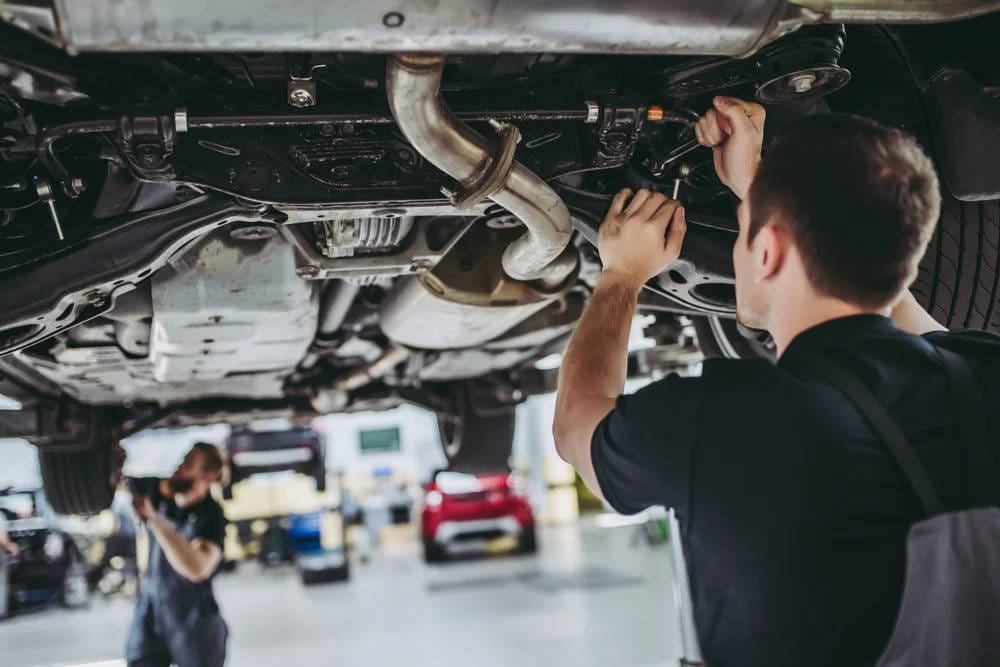
Modern vehicle technology relies on sophisticated electronics to control everything from the engine to the steering system and braking. So, how do we know when something's not quite right in your Hyundai?
The Hyundai check engine light is typically an engine-shaped orange symbol with an exclamation mark or bold letters that read "CHECK." This light will illuminate on the instrument cluster if something goes wrong.
Our article shares in detail what this all means.
What Triggers the Hyundai Check Engine Light?
Known technically as the malfunction indicator lamp, the Hyundai check engine light will light up when your vehicle's On Board Diagnostics system (OBD-II) detects a malfunction from any of the numerous sensors located in and around your vehicle.
A Hyundai check engine light can illuminate for many reasons, but it's not all bad news. A simple issue like a loose spark plug lead can trigger the light to turn on.
The OBD-II uses various and numerous sensors fitted in your Hyundai to monitor the health of the operating systems and to send a 'message' when things go wrong.
A particularly common occurrence in modern vehicles that are fitted with catalytic converters is the fouling of the O2 sensors in the exhaust system. The OBD reads electrical signals from the sensors, and when a catalytic converter clogs up or fails, it will cause the sensor to send abnormal readings, which in turn will cause the check engine light to illuminate, advising the driver of the problem.
Another prime example is loose electrical connectors, whether in critical safety circuits like the braking system or the engine's ignition system, which can cause the Hyundai check engine light to illuminate, warning the driver to take action.
How to Diagnose a Check Engine Light
Diagnosis of a check engine light is not something that can be done without the right diagnostic tool.
For example, a failed coil pack in your Hyundai's ignition system will be immediately noticeable to most astute drivers as their vehicle will misfire and not run smoothly, or there will be a noticeable change in the exhaust note along with a significant drop in performance.
However, the actual cause of the misfire will remain a mystery to the average motorist until a full diagnostic scan is made to identify the problem. Your Hyundai's On Board Diagnostics system will need to be accessed and scanned to obtain the relevant data highlighting the problem at hand.

OBD-II Scanner
A little history lesson reveals that since 1996, every new car and light-duty truck sold in the U.S. has been legally required to have an On Board Diagnostic system (OBD) fitted as standard equipment.
An OBD-II scanner is required to read the On Board Diagnostic System and obtain the required information. The OBD-II scanner consists of an electronic computing device with an LED screen to display results. Plugging the scanner into your Hyundai's dedicated OBD-II port, normally found under the dashboard or in the engine bay, allows the scanner to gather and display the fault codes.
Fault codes can either be generic (0) or manufacturer-specific. Generic codes are alphanumeric and start with a letter to indicate what system is faulty. Powertrain issue codes begin with a 'P.' For example, the code "P0420" indicates a potential problem with the catalytic converter in the powertrain system. Each number in the sequence points to the circuit where the problem lies.
Hyundai vehicles will have their own manufacturer-specific codes to allow Hyundai technicians to accurately pinpoint any problem that may arise on your Hyundai vehicle.
Professional Diagnostic Services
Numerous service providers offer vehicle diagnostic services that include testing using the special software required to highlight developing faults and issues that are causing problems to your vehicle's engine or other systems.
Hyundai's network of dealers offers factory-trained technicians and appropriate workshop facilities dedicated to the maintenance and repair of Hyundai vehicles.
Common Causes for the Hyundai Check Engine Light
As mentioned, things do go wrong, and here are some of the most common causes of that pesky Hyundai check engine light being shown:
- Loose or Damaged Gas Cap: A loose or broken gas cap is a fire risk with highly flammable escaping fumes.
- Oxygen Sensor Malfunction: An O2 sensor will cause fuel/air mixture problems and poor running from sensors, giving false readings to the engine's CPU.
- Catalytic Converter Issues: A catalytic converter not functioning correctly may lead to emissions-related issues and incorrect sensor readings that eventually cause damage to your Hyundai's engine.
- Spark Plug or Ignition Coil Problems: A faulty spark plug or ignition coil will lead to poor running of the engine, loss of performance, and eventually costly damage.
- Mass Airflow Sensor Failure: The mass airflow sensor failure causes the sensor to send the CPU incorrect signals, causing the engine to stall, jerk, or hesitate while driving, and again, possible engine damage.
How to Turn Off the Hyundai Check Engine Light
A check engine light will turn off only once the fault is remedied and the fault code is cleared by the diagnostics service provider.
Preventative Maintenance to Avoid a Check Engine Light
There is an old saying, "an ounce of prevention is worth a pound of cure," and sticking to the scheduled maintenance intervals with the required servicing and the use of quality fuel will ensure your Hyundai stays in top condition.
Regular Engine Tune-Ups
Hyundai's scheduled service intervals ensure that your engine runs optimally without any problems, preventing the Hyundai check engine light from coming on.
Quality Fuel
Believe it or not, the quality of fuel used will affect the running of your engine. Poor quality or contaminated fuel will cause the check engine light to illuminate, indicating a possible blocked fuel injector, loss of fuel pressure, or even increased fuel consumption.
Scheduled Maintenance
Regular scheduled maintenance as per Hyundai's schedules ensures that items such as fluids like the engine oil, coolants, and brake fluids are replaced when necessary, and all serviceable vehicle parts are working safely and effectively.

Schedule Service at Colonial Hyundai
If your Hyundai is due for its next scheduled service or needs any repair, contact our Service Center at Colonial Hyundai in New London, CT, to receive the best possible service experience. Taking care of your Hyundai will help ensure you have many more problem-free miles behind the wheel.



